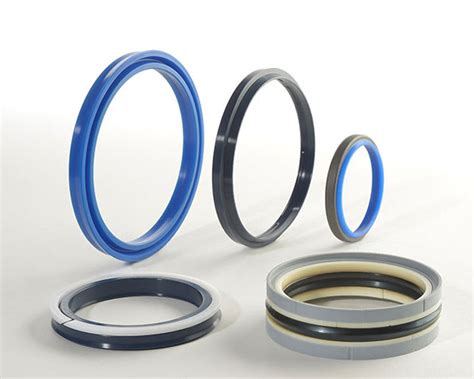The industrial sector is a hub of activity, with machinery and equipment working tirelessly to meet production demands. However, with the constant movement and friction between machine parts, there is a high risk of leaks, contamination, and equipment damage. This is where high-tech seal solutions come into play. Seals are a crucial component in industrial applications, and advancements in technology have led to the development of innovative sealing solutions that can withstand extreme temperatures, pressures, and environments.
In this article, we will explore five high-tech seal solutions that are revolutionizing the industrial sector. From advanced materials to innovative designs, these seal solutions are designed to provide reliable, efficient, and cost-effective sealing solutions for various industrial applications.
1. Advanced Polymer Seals

Advanced polymer seals are a popular choice in industrial applications due to their exceptional durability and resistance to extreme temperatures. These seals are made from high-performance polymers such as PTFE, PEEK, and PVDF, which offer excellent chemical resistance, low friction, and high thermal stability. Advanced polymer seals are ideal for applications in the chemical processing, oil and gas, and pharmaceutical industries.
Benefits of Advanced Polymer Seals
- High-temperature resistance up to 300°C
- Excellent chemical resistance to harsh chemicals and corrosive substances
- Low friction and wear rates, reducing energy consumption and extending equipment lifespan
- High sealing efficiency, reducing leaks and contamination
2. Spring-Energized Seals

Spring-energized seals are a type of seal that uses a spring to energize the seal, providing a constant sealing force. These seals are designed to operate in extreme environments, including high temperatures, high pressures, and corrosive substances. Spring-energized seals are commonly used in applications such as hydraulic systems, pumps, and valves.
Benefits of Spring-Energized Seals
- High sealing efficiency, reducing leaks and contamination
- Excellent resistance to extreme temperatures and pressures
- Low maintenance and repair costs, reducing downtime and increasing productivity
- High reliability and durability, extending equipment lifespan
3. Metal Seals

Metal seals are a type of seal that uses a metal ring or gasket to provide a secure seal. These seals are designed to operate in high-temperature and high-pressure applications, making them ideal for industries such as aerospace, automotive, and industrial manufacturing. Metal seals offer excellent durability and resistance to corrosion, making them a popular choice for applications where reliability is critical.
Benefits of Metal Seals
- High-temperature resistance up to 1000°C
- Excellent durability and resistance to corrosion
- High sealing efficiency, reducing leaks and contamination
- Low maintenance and repair costs, reducing downtime and increasing productivity
4. Hydrodynamic Seals

Hydrodynamic seals are a type of seal that uses a fluid, such as oil or water, to create a seal. These seals are designed to operate in applications where high pressures and speeds are present, making them ideal for industries such as aerospace, automotive, and industrial manufacturing. Hydrodynamic seals offer excellent sealing efficiency, reducing leaks and contamination, and are low maintenance, reducing downtime and increasing productivity.
Benefits of Hydrodynamic Seals
- High sealing efficiency, reducing leaks and contamination
- Excellent resistance to high pressures and speeds
- Low maintenance and repair costs, reducing downtime and increasing productivity
- High reliability and durability, extending equipment lifespan
5. Nanocoated Seals

Nanocoated seals are a type of seal that uses a nanocoating to provide a thin, uniform layer of material. These seals are designed to operate in applications where extreme temperatures, pressures, and corrosive substances are present, making them ideal for industries such as aerospace, automotive, and industrial manufacturing. Nanocoated seals offer excellent sealing efficiency, reducing leaks and contamination, and are low maintenance, reducing downtime and increasing productivity.
Benefits of Nanocoated Seals
- High sealing efficiency, reducing leaks and contamination
- Excellent resistance to extreme temperatures, pressures, and corrosive substances
- Low maintenance and repair costs, reducing downtime and increasing productivity
- High reliability and durability, extending equipment lifespan
Gallery of Seal Solutions






Frequently Asked Questions
What is the most common type of seal used in industrial applications?
+The most common type of seal used in industrial applications is the O-ring seal.
What is the benefit of using advanced polymer seals in industrial applications?
+The benefit of using advanced polymer seals in industrial applications is their high-temperature resistance, excellent chemical resistance, and low friction and wear rates.
What is the difference between a metal seal and a polymer seal?
+The main difference between a metal seal and a polymer seal is the material used. Metal seals are made from metal, while polymer seals are made from high-performance polymers.
In conclusion, high-tech seal solutions are revolutionizing the industrial sector by providing reliable, efficient, and cost-effective sealing solutions for various applications. From advanced polymer seals to nanocoated seals, these innovative sealing solutions offer excellent sealing efficiency, reducing leaks and contamination, and are low maintenance, reducing downtime and increasing productivity. By understanding the benefits and applications of these seal solutions, industries can improve their operations and stay ahead of the competition.
